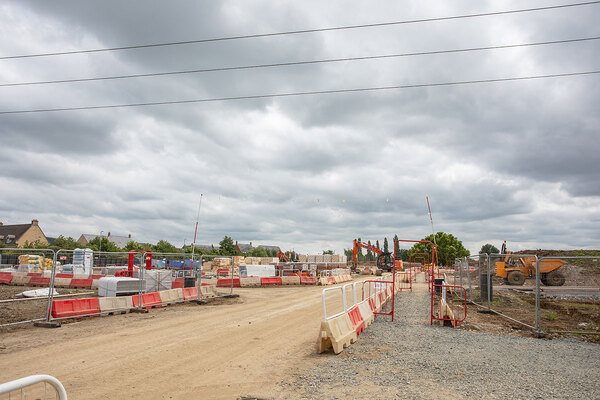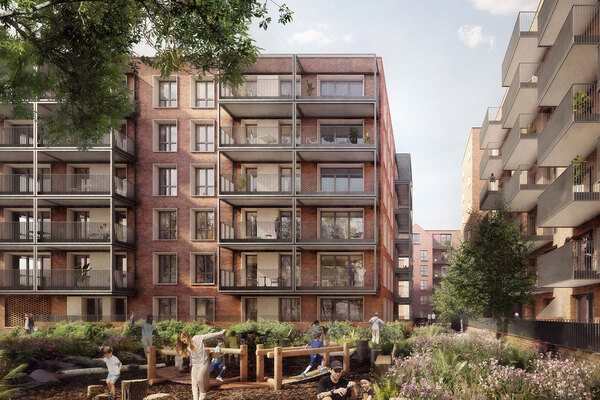Spot the difference
Devolution means politicians in Scotland and Wales can stray from the UK party line. But is there really such a big difference? Rhiannon Bury finds out.

The Conservative Party in Scotland bears many similarities to its UK counterpart. It opposes the alternative vote, wants councils to publish more details about how they spend public money and large numbers of the candidates on its website favour a blue shirt and tie combo.
When it comes to housing, however, there’s a whopping big difference. This centres on the UK party’s pride and joy - its policy of raising social rents to 80 per cent of the market rate in order to fund new house building.
While English housing minister Grant Shapps thinks this is a marvellous idea, Conservative housing spokesperson in Scotland Alex Johnstone is not just unconvinced, he opposes it.
Indeed, the Scottish Conservatives’ manifesto comes pretty close to criticising its English counterpart by proxy by slating the Scottish National Party for raising social rents in order to build more homes (something the SNP denies). Instead, the Scottish Conservatives state that they would fund additional housing with right to buy receipts, stock transfer and institutional investment.
So does this difference in opinion highlight a growing chasm in some policy areas between Scottish and Welsh parties and their English counterparts since devolution - and if so, why?
Crossing the line
The Scottish Conservative Party happily admits it has no intention of following the English party’s line all the time. A spokesperson for the Scottish party confirms that devolution means different parts of the UK ‘will seek different solutions and that is what is happening here’. The party says divergent solutions are driven by physical differences such as the fact that social homes still comprises a quarter of Scottish housing, far higher than in England or Wales in which it is 20 per cent and 19 per cent respectively.
It comes as Inside Housing’s House Proud - Devolved campaign aims to raise the profile of housing ahead of next week’s elections in Scotland, Wales and Northern Ireland.
The Conservatives aren’t the only political party taking a different line north of the border. The Scottish Labour Party revealed it is mulling charging tenants 80 per cent of market rents, depending on their income - markedly more enthusiastically than the UK Labour Party which has been largely critical of the idea (‘Affordable rents spark pre-election debate’, Inside Housing, 11 March).
Meanwhile, the Scottish Liberal Democrats are positively falling over themselves to point out that they are free to take a different line to the UK party. Jim Tolson, housing spokesperson for the Liberal Democrats in Scotland, is clear that the parties in different countries have different remits. ‘None of our manifesto is done with reference to our colleagues in London,’ he says.
‘We are a party that has that structure and we are comfortable with that. The Scottish Lib Dems can and do write their own policies for Scottish people. Of course there will be different policies at different times, but that doesn’t mean to say there’s conflict [within the party].’
The Liberal Democrats in Scotland have focused much more on tenancies than their UK counterparts did at the last general election, promising to ‘widen the tenancies available for immediate rented housing, including widening the circumstances in which short Scottish secure tenancies can be used’.
Common ground
While there are differences, however, for the most part, supporters of cross-border parties will find plenty of familiar rhetoric whichever country they live in.
The Conservatives in Scotland, for example, are enthusiastic tub-thumpers for right to buy and call to reinstate the policy in their manifesto. In November, MSPs voted to suspend right to buy in Scotland. The government says 500,000 homes were sold under the scheme since 1980.
Steve Wilcox, professor of housing policy at York University, says that whichever party forms the next administration in Scotland will be dealing with markedly different housing circumstances to England.
‘There’s been an upsurge in the level of council house building in Scotland that we haven’t seen in England,’ he says. ‘And that’s been facilitated by different financial regimes’. Work started on 1,055 local authority homes in 2010, up from 408 in 2009.
In order to kick-start the stalled house building targets in England, the UK coalition government manifesto, launched in May last year, promised to abolish regional planning powers and return decision making on housing and planning to local councils. The decisions - opposed by the Labour Party - were based on a Conservative party paper Open source planning, and the coalition will launch a new national planning policy framework next year.
In contrast, planning in Scotland is already a local function. There are strategic planning bodies, but planning is generally done at a local level and regional spatial strategies did not apply.
The Welsh way
Professor Wilcox says the differences in Wales are less stark because devolution is not as total as in Scotland, but that could be about to change. In March, the National Assembly for Wales took the next step to devolving new law-making powers by issuing a draft Commencement Order.
The order, which follows on from a yes vote in the referendum earlier that month, will mean the Assembly can use its new law-making powers to consider Welsh bills in its 20 de-volved fields, which includes housing, without permission from Westminster.
Nick Bennett, group chief executive of Community Housing Cymru, the umbrella body for Welsh housing associations, says: ‘The ‘yes’ vote means that the National Assembly will be able to make laws on subjects in all of the 20 areas for which it has powers without first needing the UK parliament’s agreement.
‘Although the housing legislative competence order had already devolved a wide range of competence over housing to Wales, including suspending the right to buy, powers over tenure, housing related support, Supporting People, homelessness and several other areas, the referendum result means that we now have powers over all housing matters in Wales.’
So far the parties in Wales seem to be broadly sticking to English party lines in terms of their housing pledges. The Conservatives champion more house building and community planning decisions, while Labour concentrates on improving housing quality.
Keith Edwards, director of the Chartered Institute of Housing in Wales, says there are still some differences: ‘The Welsh Assembly Government has taken a strong stance on welfare reform [promising to protect vulnerable people from the changes], for example.’
‘There is sometimes policy bleed - because we’re so close geographically to England, what happens [there] has much more of an impact because there are cross-border links.’
Peter King, housing lecturer at De Montfort University, says the Scottish Tories’ stance on raising rents to fund homes is symptomatic of a growing divergence in housing policy between the main parties.
While Scottish ministers voted to scrap ‘intentional homelessness’, meaning all homeless people are entitled to a home, the English system remains bound by intentionality. Scotland, too, does not have rent restructuring, freeing up landlords to set their own rents.
But he argues that the Scottish government would need further powers in order to drive truly independent decision making, namely over tax and welfare.
‘The fact that the parties are moving in different directions is inevitable,’ he states. ‘[That] wouldn’t be a problem if the countries were totally independent - but housing benefit is UK-wide and that’s imposed on Scotland.
‘If the Scottish were given the right to raise their own money and spend it that would be fine but they are not.’
There’s a consensus across the UK and its devolved nations that more homes need to be built, that existing ones need to be used more effectively, and that first-time buyers need support. While gaps between the parties in devolved countries and their English counterparts may grow over time, at the moment their similarities still outweigh their differences.
Spot the difference answers: the Scottish politician… 1) does not wear glasses, 2) has white stripes on his tie, 3) is anti 80 per cent rents, 4) wears a wedding ring, 5) has a different party logo, 6) has no lace on his right shoe
House Proud - Devolved is the latest phase of our campaign to stress the importance of housing to politicians. For more information or to express your support see our campaign page
Similarities and differences
Scotland
Liberal Democrats
- Scottish manifesto promises ‘a balance of tenure products’ in line with coalition proposals for flexible tenancies in England but didn’t get a mention in the English Lib Dem 2010 manifesto
- Both English and Scottish Lib Dems focus on reducing empty homes
Conservatives
- Scottish Conservatives will use right to buy receipts, stock transfer and institutional investment to fund new homes, rather than rent increases
- Both English and Scottish parties focus on helping first-time buyers
Labour
- Both English and Scottish parties focus on reducing homelessness by 2012
- Both champion homeownership
Wales
Liberal Democrats
- Welsh Lib Dems plan to create a housing investment trust to help house building
Labour
- Promises to explore ways to invest in new housing in Wales
- Welsh Labour promises £130 million a year to support 50,000 vulnerable people to help them find a home
Conservatives
- Welsh Conservatives plan to relate the definition of affordable housing to local price or income ratios
- Both English and Welsh parties want greater community participation in planning policy








